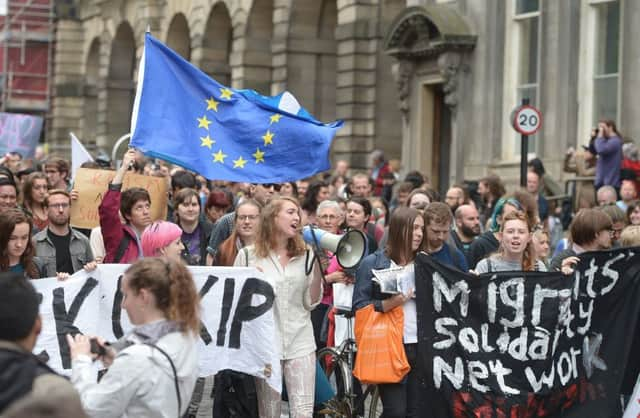Marco Gori: Pro-EU young need to talk the talk


At the many rallies against Brexit, one could see waving European flags and signs expressing how British people love Europe and how much they feel like Europeans. I do not question the veracity of such messages, but it made me think about the idea of European identity.
Much of the post-referendum rhetoric was about how by voting in favour of Brexit, older generations had stolen the future of the next one. It was as if only younger people, possibly those with a university degree, could understand and appreciate how great being a European citizen is.
Advertisement
Hide AdAdvertisement
Hide AdHowever, one could argue that the UK was never fully integrated in to the EU. It did not adopt the Euro, it did not abolish passport checks by joining the Schengen area; furthermore, you can count on the fingers of one hand the times you would see a European flag hoisted above a British building.
But what about the people? The EU is is made up of more than 400 million people with different cultures, traditions and 24 official languages. One of the goals of the EU is to promote the knowledge of languages among European citizens.
According to a Eurobarometer report, English is the second most spoken language in the EU, with 34 per cent of people speaking it. Overall, half of those who responded spoke at least one other language than their mother tongue.
On the other hand, British people do not seem to be as fond of languages. In a survey commissioned by the British Council in 2013, 75 per cent of the 4,000 interviewees were unable to hold conversation in a foreign language.
Young British people do not seem to be doing better than the average population. According to Eurostat, the proportion of EU students learning two or more languages in upper secondary education is 50 per cent, while in the UK it is only 5 per cent.
Moreover, the number of pupils sitting a language GCSE has been falling, dropping from 76 per cent in 2002 to only 48 per cent in 2015.
The decreasing number of British people interested in a second language is so worrisome that last year the British Council launched a campaign to promote learning a language as a New Year resolution.
European identity is more than an emblem on a passport. Speaking a second language is a good step towards a common understanding of Europe. It offers new possibilities and broadens your horizons.
Advertisement
Hide AdAdvertisement
Hide AdIf, as many say, Brexit was the result of ignorance and a vote by an older generation, then it’s down to young people to show they really are more European than the older generation. Explore the outside world and learn a second language.
Marco Gori is a student in Glasgow.